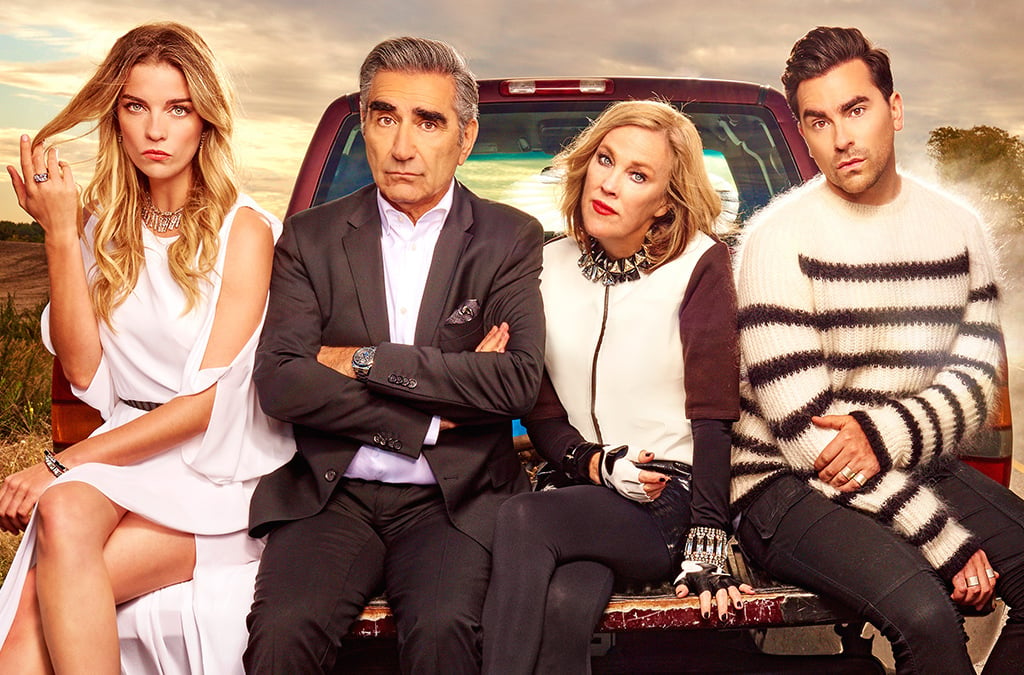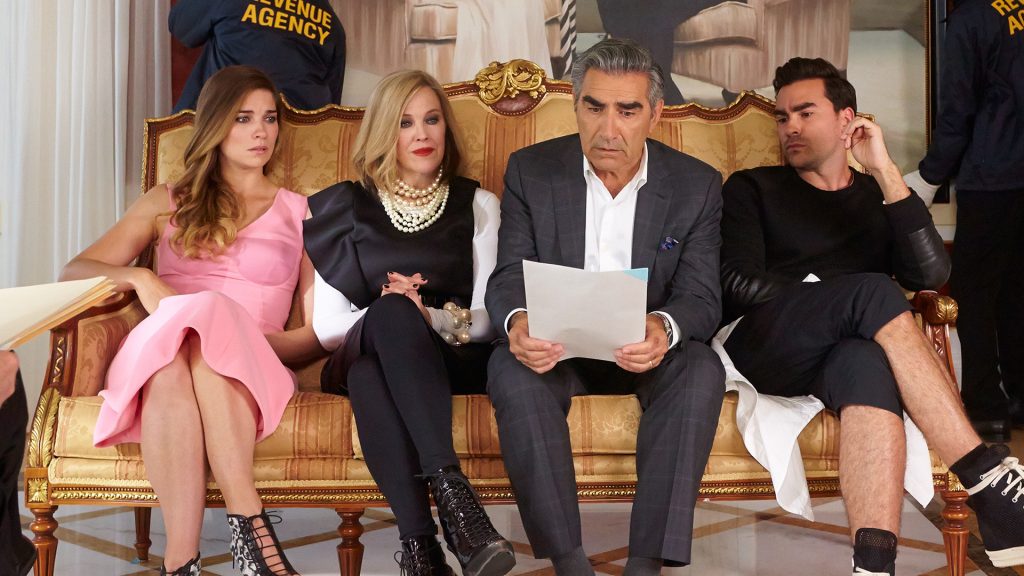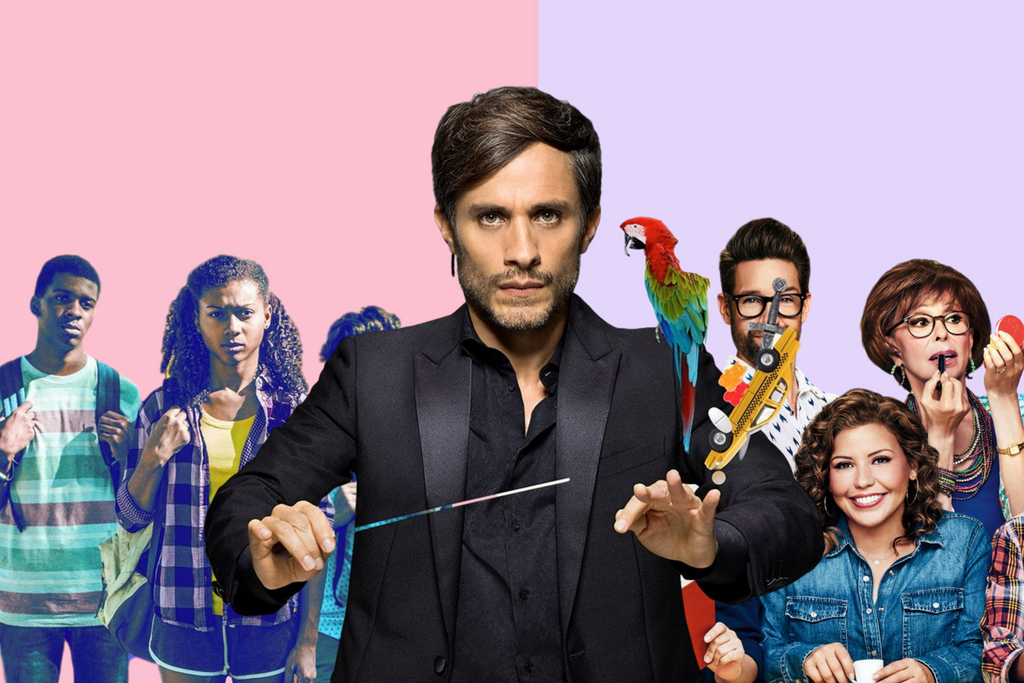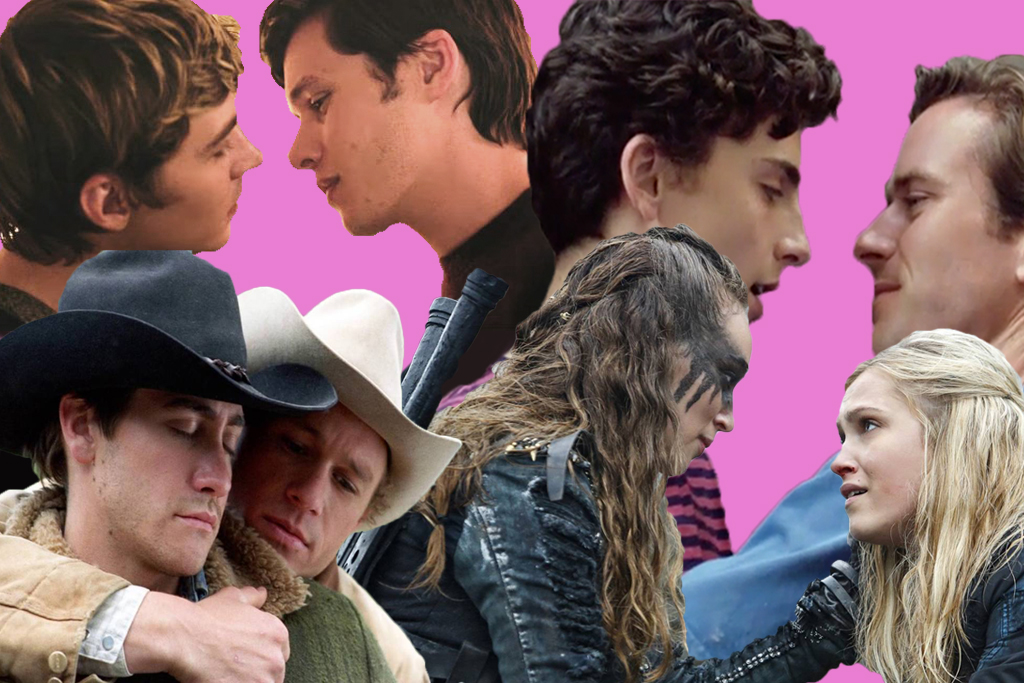‘Schitt’s Creek’ Is The Great Gay TV Rom-Com We Need Right Now
So why aren’t you watching it yet?

Based on its title, you wouldn’t necessarily expect Schitt’s Creek to be one of the best shows around right now.
When it began in early 2015, Schitt’s Creek attracted mixed reviews. Indeed, the first season starts out shaky, due in part to its initially off-putting premise: the Rose family, made wealthy by a video rental chain, has been screwed over by their business manager. With the government seizing all their assets, they’re told they’ve been allowed to keep one thing — the town of Schitt’s Creek, the deed to which they purchased as a joke birthday gift.
With nowhere else left to turn, the Roses move into the town’s motel. They react to Schitt’s Creek with sheer horror. The privilege apparent in each member of the family — their vapidity and self-absorption — makes the earliest episodes of the series feel slightly stilted, but it was part of the show’s master plan. Where most sitcoms start out with a suite of characters designed to make you like them, Schitt’s Creek instead follows the Arrested Development tack of making you observe rich, oblivious dummies let loose on the world.
Where the Bluths’ inability to change lies at the heart of Arrested’s comedy, though, the Roses have steadily transformed from out-of-touch, vain, shrill nightmares into warm, relatable, still pretty shrill delights. It’s been a joy to watch across all four seasons, but especially in the last two years thanks to two characters: David and Patrick.
Glad Romance
Schitt’s Creek was co-created by Dan Levy and his famous father Eugene. A comedy legend, Eugene Levy’s work on sketch show SCTV and in Christopher Guest mockumentaries like Best in Show and Waiting for Guffman have made him, and his frequent collaborator and co-star Catherine O’Hara, truly iconic.
Dan stars in Schitt’s Creek as David, a somewhat effeminate, over-rewarded under-achiever with a very specific wardrobe. His real life dad plays his onscreen father, Johnny, the equivocating patriarch, and O’Hara plays his mother, Moira, a former soap opera actress of slightly fading glamour and long-dimmed stardom with an anthropomorphised wig collection, eccentric fashion sense and a stunningly implacable, improbable accent. And then, of course, there’s David’s sister Alexis, played by Annie Murphy, an initially ditzy socialite who reads like a cross between Paris Hilton and Jenna Maroney.

David’s pansexuality is revealed in season two after he sleeps with Stevie, the motel’s lone, disgruntled employee. In a short, perfect scene, she broaches the topic of his preferences, asking, “I only drink red wine. And up until last night, I was under the impression that you, too, only drank red wine.” David explains, saying, “I like the wine and not the label. Does that make sense?”
They never progress beyond friendship, aside from briefly considering the possibility of a polyamorous relationship with an exceedingly hot, very unintelligent man who’s seeing both of them at once. And then in the series’ third season, as David explores his wish to build something of his own and open a store in Schitt’s Creek, he meets Patrick.
Patrick (Noah Reid) looks like he has a business degree and has had his hair cut by the same barber for his entire life. He offers to help David with his business proposal, and as they spend more time with each other, teasing and flirting, they fall for each other. Season three ends with Patrick revealing that these are all very new feelings and experiences to him that he, having grown up in a small town, had spent a long time suppressing and avoiding.
“Where most sitcoms are content for their queer characters to have largely off-screen partners, Schitt’s Creek makes sure that David’s relationship is part of the show’s DNA.”
David, by contrast, has had a string of brief, failed dalliances but never a genuine, loving relationship. Both scenarios typify common experiences for queer people when it comes to dating. As their relationship progresses, it steadily becomes the show’s main story. Where most sitcoms are content for their queer characters to have largely off-screen partners, as with Captain Holt in Brooklyn Nine-Nine or the rotating guest star boyfriends of Will & Grace, Schitt’s Creek makes sure that David’s relationship is part of the show’s DNA.
Season four, which landed on Netflix on May 15, sees the pair taking things up a notch, though with some minor hurdles. The season’s centrepiece rom-com scene comes when Patrick, having organised an open mic night to promote the store, takes to the stage to serenade David with a gorgeous acoustic cover of Tina Turner’s ‘Simply the Best’. Their dynamic is incredibly well-written; they alternate between gently mocking each other and slowly discovering how to be in a relationship that truly feels right, with a dash of pushing each other towards being better people. What more could you want to see?
It’s certainly a kind of wish fulfilment TV relationship, perhaps in part because Dan Levy is himself gay outside the show. Most importantly, Schitt’s Creek captures the intensity of what happens when — after spending so long feeling like your sexuality precluded you from finding a happy, healthy relationship — something that good finally comes around.
Homo-Romantic Comedy
The romantic comedy genre has not, historically, been terribly friendly to queer people. Occasionally we’d be at the centre of rom-coms, as with In & Out, Another Gay Movie or But I’m A Cheerleader. Other times, we’d either be sassy best friends — Brandon in Easy A, Rupert Everett in My Best Friend’s Wedding — or see lesbians and bi women routinely being objectified for the straight male gaze.
As queer representation has gotten better, so too have films and TV shows improved at giving queer characters, and thereby their relationships, the validity they deserve. No matter how you feel about the movies above, or Will & Grace, Ellen and so on, they all paved the way for what came after them.
Because comedies tend to suffer more due to changing sensibilities and cultural trends, their achievements are less frequently canonised. Dramas like Six Feet Under and Orange is the New Black are — rightly — praised for showcasing many facets of queer experiences and relationships, but without them being a show’s primary focus. Comedies struggle to achieve the same legitimacy, as they are often put into a box of being ‘fun’ and ‘light’, ostensibly lacking the depth to be taken seriously. They attain a legacy of being enjoyable, rather than being important.
This is starting to change through representation. Delightful teen sitcom Faking It represented not only a carefree, sex positive gay teenager, but also a teen girl with an intersex condition, among others. Brooklyn Nine-Nine has seen Rosa Diaz come out as bisexual, Elena on One Day at a Time is an out and proud Latinx woman. Much of why Will & Grace copped so much flack is because it was always built on a degree of self-criticism used to better appeal to straight viewers, and while the show’s revival has lessened this, newer shows have shown that they don’t need to be so cripplingly self-effacing.
On the film side, the recent release of Love, Simon has propelled same-sex romantic comedy back into the mainstream niche Hollywood tried to carve for them in the ‘90s. That film, while very good, struggled to balance its adorable gay love story with the darker plot points leading up to it, spending more time adding dimension to the straight character who suffers no consequences for viciously outing someone than it does fleshing out its gay characters.
If Love, Simon was a young adult landmark, Schitt’s Creek feels like an equivalent high point for queer romantic comedies on TV, in part because its identities never need to be a source of conflict. If Love, Simon encapsulates the adolescent feeling of having to hold your breath, Schitt’s Creek gets to show what happens after the exhale.
It presents a breadth of the spectrum of sexuality, isn’t hung up on constantly affirming its male characters’ masculinity, and all the while being consistently really fucking funny.
It’s The Schitt
None of this would work so well if the show around it weren’t so goddamn good.
Moira Rose is an impeccable comic creation on the level of Mary Richards or Leslie Knope, a fluttering, self-possessed hurricane of a woman who once hosted the non-televised portion of the People’s Choice Awards. She’s at once desperate to be the centre of attention and simultaneously repulsed by the kind of attention she gets in her new life. To say Catherine O’Hara is one of the most gifted comedic actresses of all time does not do justice to how wholly she gives life to Moira.
Alexis, meanwhile, has the other major arc of the show as she comes further into her own, realising that she is more shrewd and has more control over her own path than she realised. One of the show’s most genius tricks has been to gradually sync up David and Alexis’ specific mannerisms. At the start, they had never really paid much attention to each other than when insults were necessary, where now their bond had embedded shared sibling sensibilities into their dynamic.
That the Rose family learns to love Schitt’s Creek and the people in it only adds further to the show’s charm. The naturalism of the world the show has built, as with the patient but concise rhythms of its editing, make David and Patrick’s rom-com story that much easier to invest in.
It’s turned Schitt’s Creek into some of the best TV we have these days, and it’s bringing us — bit by bit — the great gay rom-com we’ve all wanted for years.
So why aren’t you watching yet?
—
All four seasons of Schitt’s Creek are now streaming on Netflix.
—
Laurence Barber is a freelance writer, editor and award-winning film and television critic based in Sydney. He is on Twitter @bortlb.

